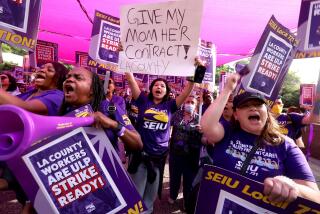Riders Flock to MTA Services, but Strike Is Predicted
- Share via
Citing “a lack of trust and communication” among the parties, the lead negotiator for the Metropolitan Transportation Authority predicted Tuesday that public transit workers are likely to strike after Labor Day.
“We are looking at a strike,” said Thomas M. Webb, an Arizona-based negotiator who has been leading the MTA’s talks on new three-year contracts for bus and rail operators, mechanics and clerical workers, whose agreements expired earlier this summer.
The MTA’s last transit workers strike, called by mechanics, occurred in 1994 and lasted nine days. Bus drivers and train operators went out in 1982 for five days.
A strike this year would be particularly crippling because supervisors have organized into their own union since the last work stoppage and would not be available to run trains or operate buses, as they did during the last walkout. With a full strike by all the unions, daily bus service could shrink from 2,000 buses to 100 operating on a “lifeline” basis. All Metro Rail service could stop.
Between them, MTA buses and trains carried 1.4 million passengers a day in July--1.2 million on buses and more than 200,000 on trains.
A strike would hurt low-income Angelenos who depend on buses--more than 60% of bus riders have annual incomes of less than $15,000, according to an MTA study--and students, thousands of whom use buses to get to and from school.
Regionally, Metrolink commuter trains would continue running, as would municipal bus lines in Los Angeles, Long Beach, Santa Monica and other cities.
With a court-ordered 60-day “cooling off” period about to expire, the two sides concede they have made little progress on major issues.
Leading the list are the MTA’s long-sought reforms in the workers’ compensation system. The transit agency also wants to introduce a four-day work week for some full-time workers and make other work rule changes designed to increase efficiency and cut down on overtime.
There are new wage and salary levels to be decided. Another overriding issue is the possible breakup of the MTA into several transit zones, including one in the San Fernando Valley, an issue that has created tensions within the unions.
Those issues are so costly and important to MTA negotiators that Webb said: “Wages aren’t an issue we are pushing.”
The MTA went into the negotiations offering workers a 2.7% increase each year over the next three years. Unions came back with requests for increases of 4.2% to 4.5%.
A cooling off period was sought after members of the MTA’s biggest union, the 4,282-member United Transportation Union, voted to authorize a strike.
The cooling off period is set to expire at midnight Sept. 4, so a strike could begin at 12:01 a.m. on Sept. 5 if an agreement is not reached.
With time running out, Webb said he was frustrated: “There is a lack of trust and communication here among parties,” that makes resolving problems “very difficult.”
Webb’s comments broke months of silence on the negotiations and appeared in part to be strategic. A veteran negotiator who has worked on transit contracts in Philadelphia, Boston and other cities, Webb clearly hopes to draw attention to the negotiations.
A United Transportation Union spokesman said he, too, hopes a strike can be avoided.
“I don’t think our union wants a strike. I don’t think the MTA wants a strike,” Goldy Norton said.
Norton said he thought there was still enough time to work out an agreement before Labor Day.
“The MTA wants a lot of major concessions from this union, and very honestly this union is not going to give up what our union has fought for and honestly won over the years,” Norton said.
*
Times staff writer Jeffrey L. Rabin contributed to this story.
More to Read
Sign up for Essential California
The most important California stories and recommendations in your inbox every morning.
You may occasionally receive promotional content from the Los Angeles Times.













